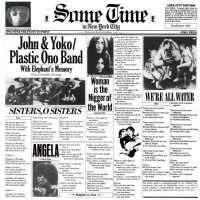
Recorded: 13 February – 8 March 1972
Producers: John Lennon, Yoko Ono, Phil Spector
Released: 15 September 1972 (UK), 12 June 1972 (US)
Available on:
Some Time In New York City
John Lennon Anthology
Acoustic
Personnel
John Lennon: vocals, guitar
Adam Ippolito: piano, organ
Gary Van Scyoc: bass guitar
Richard Frank Jr: drums, percussion
Jim Keltner: drums
John Sinclair was a writer, activist and former manager of the MC5. He had been convicted a number of times for marijuana possession prior to an incident in 1969 in which he gave two joints to an undercover narcotics officer.
In July 1969 Sinclair was given a 10-year prison sentence for the offence. The conviction caused protest and disquiet among counterculture and anti-establishment figures, and a “Ten For Two” rally was scheduled to take place at the Crisler Arena in Ann Arbor, Michigan, on 10 December 1971.
John Lennon identified with Sinclair, having himself been arrested for marijuana possession in October 1968. He was inspired to write what effectively became the campaign anthem for Sinclair, and he and Yoko Ono agreed to perform at the Crisler Arena rally.
They wanted a song about John Sinclair. So I wrote it. That’s the craftsman part of me. If somebody asks me for something, I can do it. I can write anything musically. You name it. If you want a style and if you want something for Julie Harris or Julie London, I could write it. But I don’t enjoy that kind of work. I like to do inspirational work. I’d never write a song like that now.
All We Are Saying, David Sheff
‘John Sinclair’ was one of just two songs on Some Time In New York City to be written by Lennon alone – the other was ‘New York City’.
Lennon recorded a demo of the song towards the end of 1971, accompanying himself on a dobro steel-stringed guitar, which he played with a slide. The instrument was used again on the album recording the following year.
At the Crisler Arena, Lennon and Ono were accompanied by Eddie Mottau, Tom Doyle and Chris Osborne on acoustic guitars, David Peel on a washtub bass, Jerry Rubin, Frank Lanci and Billy Minelli on percussion, and Leslie Bacon on backing vocals. The performance of ‘John Sinclair’ was later released on the 1998 box set John Lennon Anthology and again on the 2004 album Acoustic.
Three days later, on 13 December, Sinclair was released from Jackson State Prison. Shortly after arriving back home he telephoned Lennon and Ono at the Record Plant East studio to thank them for their support.
With Sinclair free, the song was essentially outdated and redundant, but Lennon decided to perform it once more on The David Frost Show on 16 December 1971. The show was broadcast on 13 January 1972, and also included performances of ‘Attica State’, ‘The Luck Of The Irish’, and ‘Sisters, O Sisters’.
Sessions for Some Time In New York City took place in February and March 1972. By that time Sinclair had been free for several weeks, and by the time the album was issued in the US in June 1972 it was well out of date. Lines such as “Free John now, if we can” demonstrated that, like much of the album’s simplistic sloganeering, Lennon’s political rhetoric was largely devoid of substance.


I was part of the percussion back up vocals in Ann Arbor .
Thanks for commenting Frank. Do you have any memories from the concert you can share with us? How did you come to be onstage with John and Yoko?
I was part of David Peel and The Lower East side as was Tom Doyle, Billy Mineli and we were recording on Apple Records . Love+Peace Lance
Hi, Did you know my cousin Leslie Bacon?
I’m proud to have been playing that night. He has influenced my music all these years. I wish he was still here but his memory will always be with me as a great teacher. Frank Lance as well as myself were in our early 20s at the time.
I remember reading many years ago that John Sinclair tried to sue JL over the song. I can’t believe that would be true. I love Lennons work from around this time. It has no constraints or boundaries. It’s also very good lyrically and musically. I think it’s amazing to have played with him. I would have to say that ever since I was a youngster John was, and is a huge influence on me. He was just so creative.
Great little song Sinclair and baby please don’t go are only highlights on album.
Definitely an earworm of a song ( gotta, gotta, gotta…….) , Nice slide guitar a passionate Lennon vocal
Removed from the context of 1972, the entire album isn’t as triggering as it was 50+ years ago